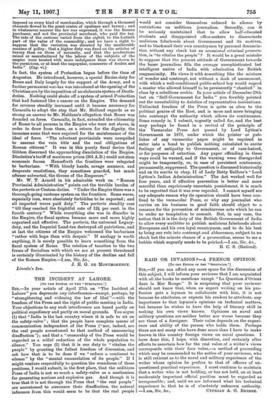THE INCIDENT AT LAHORE.
ITO TUB EDITOR OP TUB " SPECTATOR"' SIR,—In your article of April 27th on "The Incident at Lahore" you deprecate any interference—except, perhaps, by "strengthening and widening the law of libel —with the freedom of the Press and the right of public meeting in India. Your objections to any such interference are based partly on political expediency and partly on moral grounds. You argue (1) that "India is the last country where it is safe to sit on the safety-valve" ; that the people have complete means of communication independent of the Press (" nor, indeed, are the real people accustomed to that method of announcing disaffection"); and that a "censorship of the Press would be regarded as a wilful reduction of the whole population to silence." You urge (2) that it is our duty to " vitalise the people" by granting the fullest freedom of discussion, and ask how that is to be done if we "reduce a continent to silence" by the "mental emasculation of its people." If I might venture respectfully to question the soundness of these positions, I would submit, in the first place, that the seditious Press of India is not so much a safety-valve as a mechanism for generating noxious and explosive gas. And though it is true that it is not through the Press that "the real people" are accustomed to announce thew disaffection, the natural inference from this would seem to be that the real people I —I am, Sir, Ate., would not consider themselves reduced to silence by restrictions on seditious journalism. Secondly, can it be seriously maintained that to allow half-educated students and disappointed office-seekers to disseminate malicious falsehoods about Government and its motives, and to blackmail their own countrymen by personal denuncia- tion, without any check but an occasional criminal prosecu- tion, is "to vitalise the people"? It would be a great mistake to suppose that the present attitude of Government towards the baser jommalism fills the average unsophisticated but intelligent native of India with admiration for British magnanimity. He views it with something like the mixture of wonder and contempt, not without a dash of amusement, with which a well-conditioned public-school boy would regard a master who allowed himself to be persistently " cheeked" in class by a rebellious urchin. In your article of December 29th last on "Self-Government for India" you forcibly pointed out the unsuitability to Asiatics of representative institutions. Unlimited freedom of the Press is quite as alien to the political genius of the East, and is more and more bringing into contempt the authority which allows its continuance. Some remedy is, I submit, urgently called for, and the best may perhaps be found in a revival of the principle of the Vernacular Press Act passed by Lord Lytton's Government in 1878, under which the printer or pub- lisher of any vernacular paper might be required to enter into a bond to publish nothing calculated to excite feelings of antipathy to Government, or of race-hatred, or for purposes of extortion. Any paper offending in these ways could be warned, and if the warning were disregarded might be temporarily, or, in case of persistent contumacy, permanently, suppressed. The question is discussed historically and on its merits in chap. 11 of Lady Betty Balfour's "Lord Lytton's Indian Administration." The Act worked well for four years, and if effective prevention is better and more merciful than capriciously uncertain punishment, it is much to be regretted that it was ever repealed. I cannot myself see any adequate reason why its operation should have been con- fined to the vernacular Press, or why any journalist who carries on his business in good faith should object to a measure for the prevention of mischievous acts which he can be under no temptation to commit. But, in any case, the notion that it is the duty of the British Government of India to allow every scribbler to publish malicious falsehoods about Europeans and his own loyal countrymen, and to do his best to bring our rule into contempt and abhorrence, subject to no check but the minute chance of a prosecution, seems to me a bubble which urgently needs to be pricked.—I am, Sir, &c.,
B. C. S. (Retired).










































 Previous page
Previous page